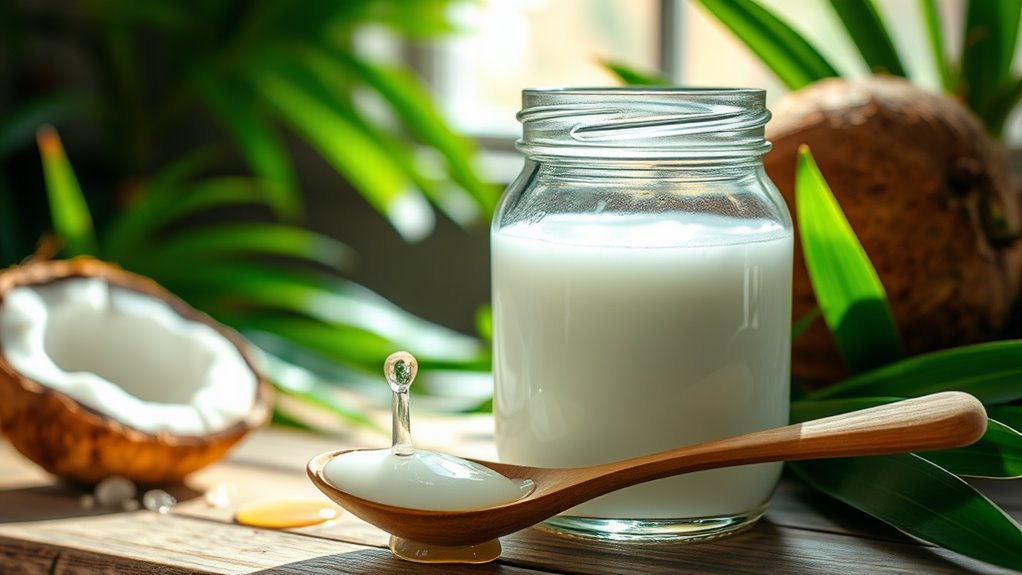Why Everyone Is Talking About Coconut Oil Pulling
You’ve probably heard the buzz about coconut oil pulling and wondered what all the fuss is about. This ancient practice is gaining traction for its potential to improve oral health and even benefit skin and digestion. With lauric acid at its core, coconut oil offers impressive antibacterial properties. But what exactly makes it so effective? As we explore the origins, benefits, and science behind oil pulling, you’ll discover why this trend might be worth considering.
Key Takeaways
- Coconut oil pulling has ancient roots in Ayurvedic medicine, promoting oral health through swishing oil in the mouth.
- It effectively reduces harmful bacteria and plaque buildup, improving gum health and freshening breath.
- The lauric acid in coconut oil disrupts cell membranes of harmful microorganisms, enhancing overall oral hygiene.
- Regular practice can offer additional benefits like clearer skin and improved digestive health due to its anti-inflammatory properties.
- Users appreciate the routine’s simplicity and the potential for healthier smiles, making it a popular wellness trend.
The Origins of Oil Pulling
Oil pulling, a practice that dates back thousands of years, originated in ancient Ayurvedic medicine, primarily in India. This traditional method involves swishing oil in your mouth to promote oral health. Though various oils have been used, oil pulling with coconut oil has gained popularity due to its antimicrobial properties and pleasant taste. Ancient texts highlight its role in detoxifying the body and maintaining healthy gums and teeth. Recent studies suggest that coconut oil may help reduce harmful bacteria and improve gum health, making it a beneficial addition to your oral hygiene routine. As you explore this time-honored technique, you’ll find that oil pulling not only connects you to a rich history but may also offer modern benefits for your oral hygiene routine.
How Coconut Oil Works for Oral Health
Coconut oil’s antibacterial properties can greatly improve your oral health by targeting harmful bacteria in your mouth. Regular oil pulling not only reduces plaque buildup but also helps freshen your breath naturally. Additionally, lauric acid found in coconut oil effectively disrupts the cell membranes of harmful microorganisms, further enhancing its oral health benefits.
Antibacterial Properties
When it comes to improving oral health, few natural remedies boast the powerful antibacterial properties of coconut oil. Its main component, lauric acid, effectively fights harmful bacteria like Streptococcus mutans, which contributes to tooth decay and gum disease.
By swishing coconut oil in your mouth, you create an environment that discourages bacterial growth. This process not only helps reduce bad breath but may also promote overall gum health.
Studies have shown that regular oil pulling can substantially lower bacterial counts in the mouth, making coconut oil a simple yet effective addition to your oral hygiene routine.
Reduces Plaque Buildup
Swishing coconut oil isn’t just about fighting bacteria; it also plays a significant role in reducing plaque buildup.
When you swish coconut oil in your mouth, its unique properties help loosen debris and plaque from your teeth.
The oil binds with the fats in plaque, making it easier to remove during brushing.
Studies indicate that regular oil pulling can lead to a noticeable decrease in plaque and gingivitis.
By incorporating this simple practice into your oral hygiene routine, you can enhance your dental health, promote a cleaner mouth, and set the stage for a brighter smile.
Give it a try!
Freshens Breath Naturally
Ever wondered how a simple practice like oil pulling can freshen your breath? Coconut oil’s unique properties play a key role.
When you swish the oil around your mouth, it helps to absorb and eliminate odor-causing bacteria.
Studies show that coconut oil contains lauric acid, which has antimicrobial effects, effectively targeting the germs responsible for bad breath.
Additionally, oil pulling promotes saliva production, which is essential for maintaining oral health and neutralizing odor.
By incorporating this practice into your routine, you can enjoy a naturally fresher breath while supporting overall oral hygiene.
Give it a try and feel the difference!
Potential Benefits Beyond Oral Care
While many people focus on coconut oil pulling for oral health, you might be surprised to learn it offers benefits beyond just your mouth.
This practice can enhance your skin health, support your digestive system, and even provide anti-inflammatory properties. Additionally, the antimicrobial power of coconut oil can help reduce harmful bacteria throughout the body.
Exploring these additional advantages can help you maximize the potential of coconut oil in your daily routine.
Skin Health Benefits
Coconut oil pulling isn’t just a trend for oral health; it also offers potential skin health benefits that can enhance your beauty routine.
By swishing coconut oil in your mouth, you’re not only reducing harmful bacteria but also helping to promote clearer skin.
The antimicrobial properties of coconut oil can combat acne-causing bacteria, while its moisturizing qualities keep your skin hydrated.
Plus, the antioxidants found in coconut oil may help reduce inflammation and promote a youthful glow.
Incorporating coconut oil pulling into your daily regimen could lead to a clearer, healthier complexion, making it a win-win for your skin!
Digestive System Support
Many people overlook the potential benefits of coconut oil pulling for digestive health. This practice can help reduce harmful bacteria in your mouth, which may indirectly support your gut microbiome.
When you swish coconut oil, it may also aid in the absorption of nutrients, thanks to its medium-chain triglycerides that promote better digestion.
Additionally, some studies suggest that oil pulling can help alleviate symptoms of gastrointestinal discomfort, such as bloating or indigestion.
Anti-Inflammatory Properties
Oil pulling with coconut oil isn’t just about oral hygiene; it may also offer impressive anti-inflammatory benefits.
Research suggests that the medium-chain fatty acids in coconut oil, particularly lauric acid, possess strong anti-inflammatory properties.
When you swish coconut oil in your mouth, these compounds can potentially reduce inflammation markers in the body.
This means it might help alleviate conditions like arthritis or other inflammatory diseases.
Additionally, by improving oral health, coconut oil pulling may prevent systemic inflammation, contributing to overall wellness.
Incorporating this practice could be a simple yet effective way to support your body’s fight against inflammation.
The Science Behind Oil Pulling
The science behind oil pulling reveals a fascinating interplay between traditional practices and modern understanding of oral health. This ancient technique involves swishing oil in your mouth, which may help reduce harmful bacteria and improve gum health. Research suggests that coconut oil’s lauric acid plays a key role in its antimicrobial properties. Additionally, oil pulling is praised for its ability to attract and trap harmful bacteria that can cause oral health issues.
| Benefit | Mechanism | Evidence |
|---|---|---|
| Reduces bacteria | Disrupts cell membranes | In vitro studies |
| Improves gum health | Anti-inflammatory effects | Clinical trials |
| Freshens breath | Reduces volatile sulfur | User testimonials |
Common Misconceptions About Coconut Oil Pulling
Coconut oil pulling is often surrounded by a cloud of misconceptions that can confuse those curious about its benefits.
Many believe it’s a substitute for brushing and flossing, but it’s not; it’s meant to complement your oral hygiene routine.
Some think it’ll instantly whiten teeth, but results take time and vary by individual.
Others worry it may harm dental work, yet studies show it’s safe for most.
Finally, people often assume it cures all ailments, but while it offers potential benefits for oral health, it’s not a miracle solution. Oil pulling addresses the root cause of bad breath, not just masking the odor.
Understanding these misconceptions can help you approach oil pulling with realistic expectations.
How to Start Your Oil Pulling Routine
Starting an oil pulling routine can be an easy addition to your daily oral care practices.
To get started, follow these simple steps:
- Choose Your Oil: Coconut oil is popular due to its antimicrobial properties, but you can also use sesame or olive oil.
- Start Small: Begin with just 1 teaspoon of oil. Gradually increase to 1 tablespoon as you get comfortable.
- Timing Is Key: Swish the oil for 15-20 minutes, preferably in the morning before eating or drinking.
With consistency, you may notice improved oral health and fresher breath. Research shows significant reduction of harmful bacteria in the mouth through regular oil pulling.
Enjoy the journey to a healthier smile!
Tips for Maximizing the Benefits of Oil Pulling
How can you truly maximize the benefits of oil pulling?
First, choose high-quality, organic coconut oil to guarantee you’re using the best ingredients.
Aim for a consistent routine, ideally pulling for 15-20 minutes each day.
Start on an empty stomach to enhance absorption.
Swish gently, avoiding excessive force to prevent jaw fatigue.
Don’t swallow the oil; it’s filled with toxins and bacteria.
Afterward, rinse your mouth with warm water and brush your teeth for best results.
Staying hydrated and maintaining a balanced diet will also support your oral health, enhancing the overall effectiveness of your oil pulling practice. Additionally, incorporating oil pulling into your daily routine can contribute to reducing plaque formation, which is essential for maintaining optimal dental health.




